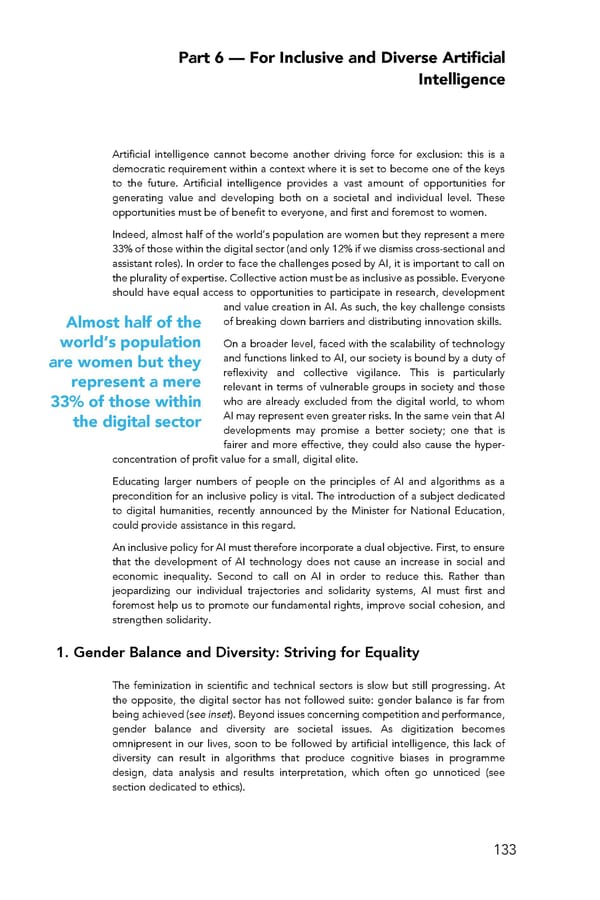Part 6 — For Inclusive and Diverse Artificial Intelligence Artificial intelligence cannot become another driving force for exclusion: this is a democratic requirement within a context where it is set to become one of the keys to the future. Artificial intelligence provides a vast amount of opportunities for generating value and developing both on a societal and individual level. These opportunities must be of benefit to everyone, and first and foremost to women. Indeed, almost half of the world’s population are women but they represent a mere 33% of those within the digital sector (and only 12% if we dismiss cross-sectional and assistant roles). In order to face the challenges posed by AI, it is important to call on the plurality of expertise. Collective action must be as inclusive as possible. Everyone should have equal access to opportunities to participate in research, development and value creation in AI. As such, the key challenge consists Almost half of the of breaking down barriers and distributing innovation skills. world’s population On a broader level, faced with the scalability of technology are women but they and functions linked to AI, our society is bound by a duty of represent a mere reflexivity and collective vigilance. This is particularly relevant in terms of vulnerable groups in society and those 33% of those within who are already excluded from the digital world, to whom the digital sector AI may represent even greater risks. In the same vein that AI developments may promise a better society; one that is fairer and more effective, they could also cause the hyper- concentration of profit value for a small, digital elite. Educating larger numbers of people on the principles of AI and algorithms as a precondition for an inclusive policy is vital. The introduction of a subject dedicated to digital humanities, recently announced by the Minister for National Education, could provide assistance in this regard. An inclusive policy for AI must therefore incorporate a dual objective. First, to ensure that the development of AI technology does not cause an increase in social and economic inequality. Second to call on AI in order to reduce this. Rather than jeopardizing our individual trajectories and solidarity systems, AI must first and foremost help us to promote our fundamental rights, improve social cohesion, and strengthen solidarity. 1. Gender Balance and Diversity: Striving for Equality The feminization in scientific and technical sectors is slow but still progressing. At the opposite, the digital sector has not followed suite: gender balance is far from being achieved (see inset). Beyond issues concerning competition and performance, gender balance and diversity are societal issues. As digitization becomes omnipresent in our lives, soon to be followed by artificial intelligence, this lack of diversity can result in algorithms that produce cognitive biases in programme design, data analysis and results interpretation, which often go unnoticed (see section dedicated to ethics). 133
 For a Meaningful AI - Report Page 131 Page 133
For a Meaningful AI - Report Page 131 Page 133